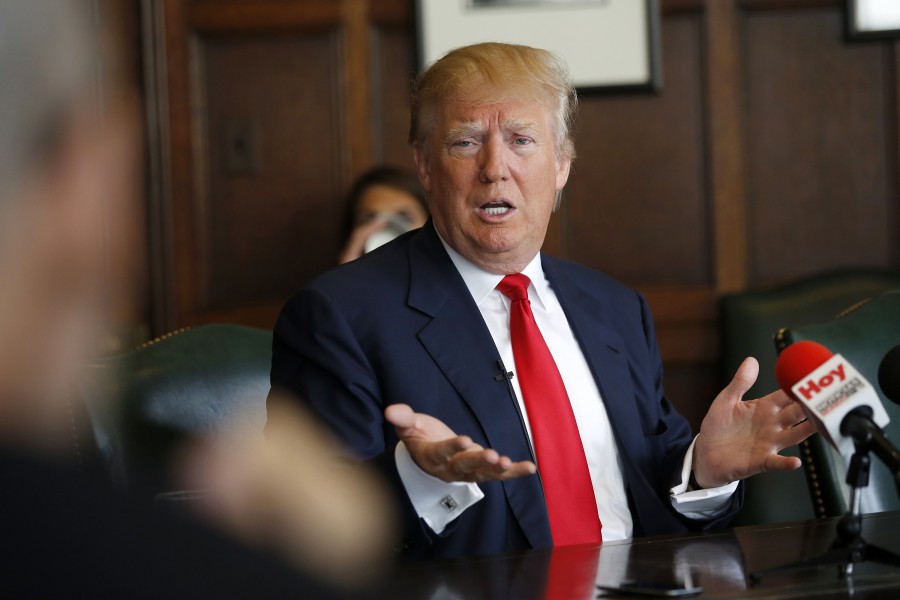You’re… elected? Explaining the Donald Trump phenomenon
Former reality star runs for president.
Donald Trump is once again on our television screens, but this time in a radically (some might add bizarre) new context: as Republican frontrunner in the 2016 presidential election. Once written off as a publicity stunt, Donald Trump’s campaign for the presidency has shattered expectations. Trump currently leads the pack of Republican candidates in New Hampshire according to Public Policy Polling and Monmouth University. At 35% in the PPP poll to just 11% for John Kasich, his closest competitor in the state, Trump has left more “mainstream” candidates trailing far behind.
At the same time, however, the real estate magnate and television icon’s campaign has been a magnet for controversy from the start. His comments equating Mexican immigrants with rapists and drug runners, his austere immigration policy entailing the deportation of eleven million undocumented immigrants, and recent confrontation with Univision reporter Jorge Ramos have alienated the majority of Hispanic and Latino voters. Even Fox News, a network frequently described as a political entity due to its influence on Republican politics, has fallen out with Trump following a feud with GOP Debate moderator Megyn Kelly.
This raises the question: what explains Trump’s appeal?
“Voters will find his frank remarks a refreshing change from the carefully crafted sound bites offered by his Republican challengers,” said Mrs. Suzanne Borger, an AP US Government teacher at MHS. “Voters also seem to admire his confidence and his financial success. It remains to be seen if these qualities will lead to a victory in November 2016.”
Trump’s campaign is essentially populist, focusing primarily on the vote of the conservative working class, many of whom have felt the brunt of American trade policies favoring outsourcing and lower wages. Income inequality has been a pressing issue in the 2016 election, and many voters are turning away from “status-quo” candidates such as Hillary Clinton and Jeb Bush and looking towards grassroots-oriented, populist candidates.
Bernie Sanders is the Democratic populist candidate, who favrs a Scandinavian-influenced, democratic socialist reform platform to tackle income inequality, and currently has a 7 percent lead over Hillary Clinton in New Hampshire (PPP poll). While both candidates seek to garner the support of the working class, Sanders favors domestic reforms (tax reform, single-payer healthcare, regulation of Wall Street) whereas Trump’s reforms are outward-looking, focusing on external sources for a perceived loss of national pride. Trump has successfully appealed to nationalist and nativist sentiment (his campaign slogan promises to “Make America Great Again”), directing his message towards a segment of the population disgruntled by job competition from immigrants and foreign companies, especially Chinese.
“America is a brand and the brand has been hurting a very long time, and it takes somebody like Trump to bring that brand back,” said a supporter at a focus group conducted by pollster Frank Luntz.
Another element distinguishing Trump from “establishment” candidates is his trademark candor, familiar from his days on “The Apprentice”.
“Am I going to vote for him? Probably not,” said MHS senior Brian Smith. “But I do respect his honesty.”
Supporters interpret his brash, unrehearsed interactions with the media as subversion of its influence over politics, contrasting them favorably with the scripted statements of other candidates. One participant in the Luntz focus group described the media as, “de facto the power behind the throne in this country”, and praised Trump’s willingness to confront mainstream news organizations.
“Every time the media thinks it’s got a ‘gotcha’, he turns it around on them,” said another participant.
Despite the promising polling data, it is still too early to know whether Trump will make it past the primaries. Opponents cite his unpopularity with minority voters, lack of political experience, impractical policies (such as forcing Mexico to pay for a gigantic wall along the southern border), and his lack of support from Fox News and the Republican party as possible reasons that his campaign will flounder. This last point is especially important, as Jeb Bush and other notable Republicans point to his previously liberal positions on various issues in attempts to undermine his conservative appeal.
The latest Iowa caucus data provides further evidence that Trump’s campaign may lose steam. Unlike in the New Hampshire polls, Trump only leads by a slim margin. Neurosurgeon Ben Carson comes in close second, behind by only 5 percent, and with the highest favorability rating (79%) of any GOP candidate he may overtake Trump.
What is certain, though, is that Trump’s boisterous antics will continue to dominate the airwaves for the time being.










